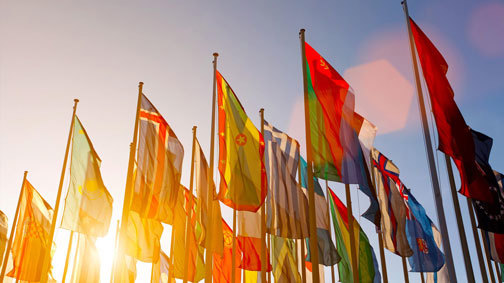
The Faroe Islands in the international community
The Faroe Islands are a self-governing nation with extensive autonomous powers and responsibilities within the Kingdom of Denmark.
The Faroese political system is a variation of the Scandinavian style of parliamentary democracy. The legislative assembly, the Løgting, is one of the oldest parliaments in the world. The executive government, Føroya Landsstýri, is headed by the Prime Minister, known in Faroese as løgmaður.
The autonomy of the Faroe Islands was established by the Home Rule Act of 1948. A principal objective of the Home Rule Arrangement has been to facilitate the transfer of authority and thus responsibility to the Government of the Faroe Islands in recognition of the special position of the Faroe Islands from national, historical and geographical points of view within the Kingdom of Denmark.
The Faroe Islands have exclusive competence to legislate and govern independently in a wide range of areas. These include external trade relations, customs, taxation and financial policy, business regulation, management of fisheries and all other utilisation of natural resources, energy and the environment, the labour market, social security, emergency preparedness, education, research and culture.
Faroese autonomy in foreign relations is provided for by a treaty between the Faroe Islands and Denmark, the Foreign Policy Act from 2005. The Foreign Policy Act gives full powers to the Government of the Faroes to negotiate and conclude agreements under international law on behalf of the Kingdom of Denmark where such agreements relate solely to matters for which internal powers have been transferred to the Faroese Authorities.
Bilateral Agreements and Membership of International Organisations
As a third country in relation to the EU, the Faroe Islands have a fisheries agreement, an agreement on trade in goods, and an agreement on research cooperation with the EU. In 2006, the Faroe Islands entered into a special economic treaty with Iceland, the Hoyvík Agreement, which established a single economic area encompassing both countries, with free movement of goods, services, capital and persons.
In addition to the EU and Iceland, the Faroe Islands have bilateral free trade agreements with Norway, Switzerland, Turkey and the United Kingdom.
The Faroe Islands are a full member of the North Atlantic Marine Mammal Commissionin, under their own name, and an associated member of three United Nations specialized agencies – the International Maritime Organization, IMO; the Food and Agriculture Organization, FAO; and the United Nations Educational, Scientific and Cultural Organization, UNESCO. They take active part in the regional fisheries management organisations NEAFC, NAFO and NASCO in conjunction with Greenland, as well as separately in SPRFMO.
The Faroe Islands also have bilateral fisheries agreements with Greenland, Iceland, Norway and the Russian Federation, which provide for mutual exchange of fisheries opportunities and access to fish in each other’s waters.
The Faroe Islands participate actively in the multilateral Nordic Cooperation established by the Helsinki Treaty. This treaty has established close cultural cooperation among the Nordic countries, with a common labour market, no passport control, as well as providing for close cooperation regarding social services and access to schools and universities.
The Faroe Islands are recognised as a self-governing entity in the Nordic Council of Ministers, which provides for active participation of the Faroe Islands in their own name. There is full political consensus in the Faroe Islands for attaining full membership of this organisation.
